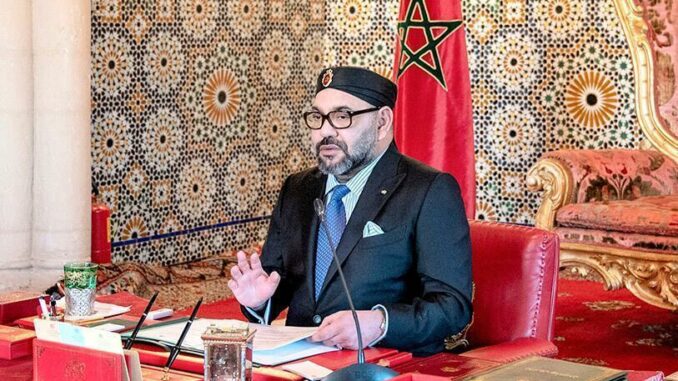
Morocco’s progress and prosperity cannot be conceived separately from those of Arab and African countries, the Kingdom being member of the Arab, Islamic and African family, said King Mohammed VI.
Morocco, a proud member of the Arab, Islamic and African family, is keen to continue exchanging experiences in various fields, and putting its expertise and qualified human resources at the disposal of our friends and sister nations. “The aim is to enhance our development capabilities, for I cannot imagine my country’s progress and development without that of our Arab and African brothers and sisters,” said the Sovereign in a message addressed to participants in the joint annual meetings of Arab financial institutions, which opened this Saturday in Rabat.
The King called on Arab financial institutions to continue to finance basic infrastructure upgrading projects which contribute to economic integration, and boosting development cooperation between Arab countries and between Arab and African nations, especially in the energy, land, rail and sea connectivity sectors.
In this connection, the Sovereign recalled that Morocco has embarked on several joint projects aimed at strengthening Arab and African economic integration, such as the gas pipeline project between Morocco and Nigeria. “This strategic project seeks to promote peace and shared development and enhance energy security at continental and international levels,” he said, commending the support provided by regional and international financial institutions, which have contributed to financing the studies relating to this promising project and expressed their willingness to contribute to the implementation of this major, continental structural project.
The King also pleaded for greater efforts on the part of Arab financial institutions to support digital transformation strategies…One of the promising sectors for reducing regional disparities and promoting the socio-economic inclusion of young people, especially in rural areas.
He stated further that topping the list of the qualitative financing desired are funds devoted to universal social protection and the promotion of education and vocational training – since these two sectors have a direct bearing on the preservation and development of human capital – as well as to economic and social fields. “Special attention should also be paid to establishing strong links between the development of education and vocational training and the needs of the labor market. Involving the private sector and the stakeholders concerned should also be a priority,’ the King insisted.
On a different level, the Sovereign highlighted the pivotal and multi-faceted role played by the private sector in the development process, stressing the need to boost the active, responsible involvement of that sector as a dependable partner for the consolidation of development models in Arab countries. In addition to the expertise it offers, the private sector creates jobs and plays a key role in tackling the development challenges the Arab region faces in areas relating to food security, education, and health.
“I therefore invite Arab financial institutions to take particular interest in entrepreneurial initiatives, especially those of medium, small and very small enterprises, and to support financial inclusion and enhance competitiveness.”
King Mohammed VI also mentioned among the main priorities that should top the development agenda of Arab financial institutions in the coming years proactive responses to the climatic disruptions affecting the world in general, and the Arab region, in particular. “Thus, preferential financing terms should be offered for projects aimed at promoting the transition to a sustainable green economy, in addition to supporting research, the sharing of experiences and capacity building in this field,” he argued.
He pointed out, in this regard, that Arab financial institutions’ support for member countries’ efforts to preserve climate security and build a green economy also implies supporting Arab countries in international development forums in order to strike a balance between their financing capabilities and contribution to curbing gas emissions which cause climate change. Arab financial institutions should also play a mediating role for the fulfilment of the financing pledges made by the international community within the framework of the Paris Climate Agreement, the King stated further.
In this connection, he underlined the close connection between climate security and food security, especially when it comes to supporting Arab countries’ water security efforts and the adoption of a roadmap for Arab agricultural integration, in ways that reconcile current constraints with food self-sufficiency aspirations in the Arab world.
